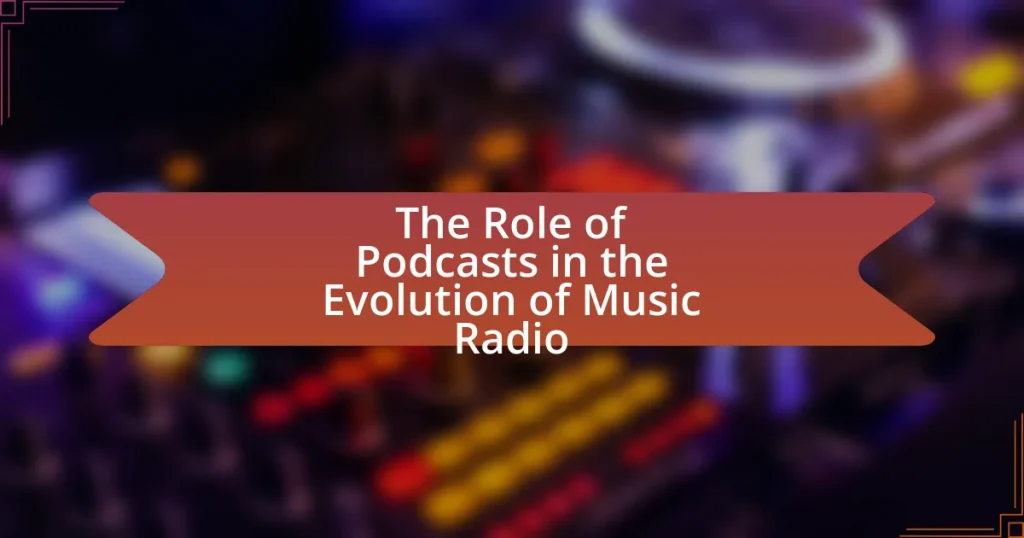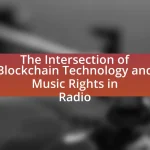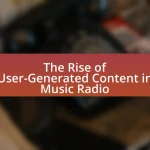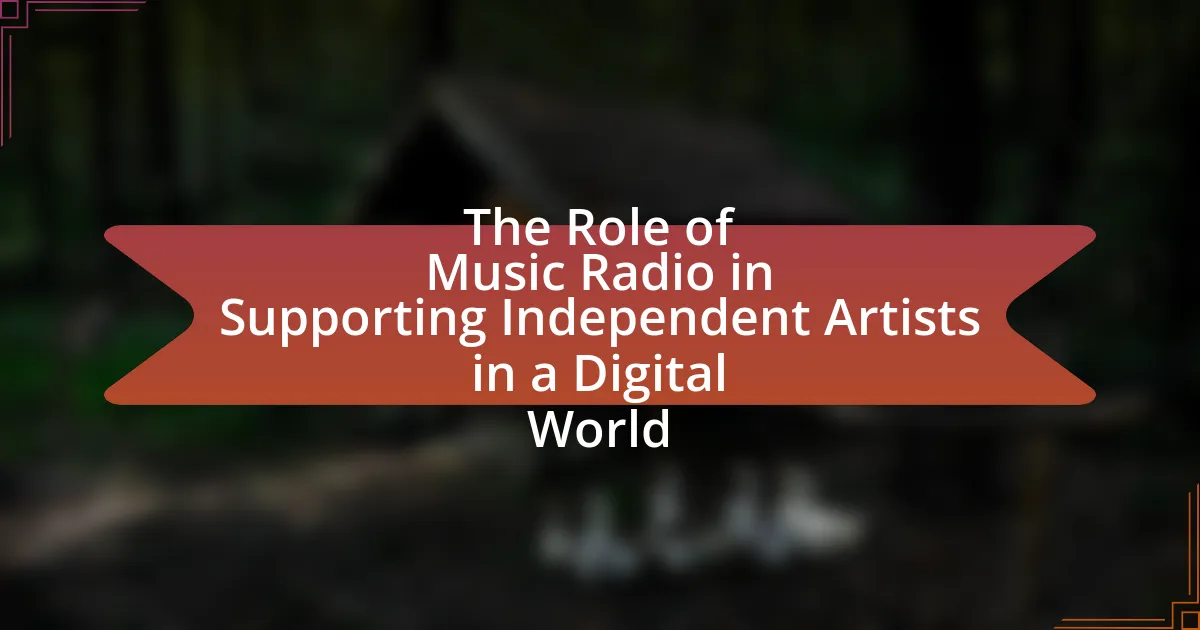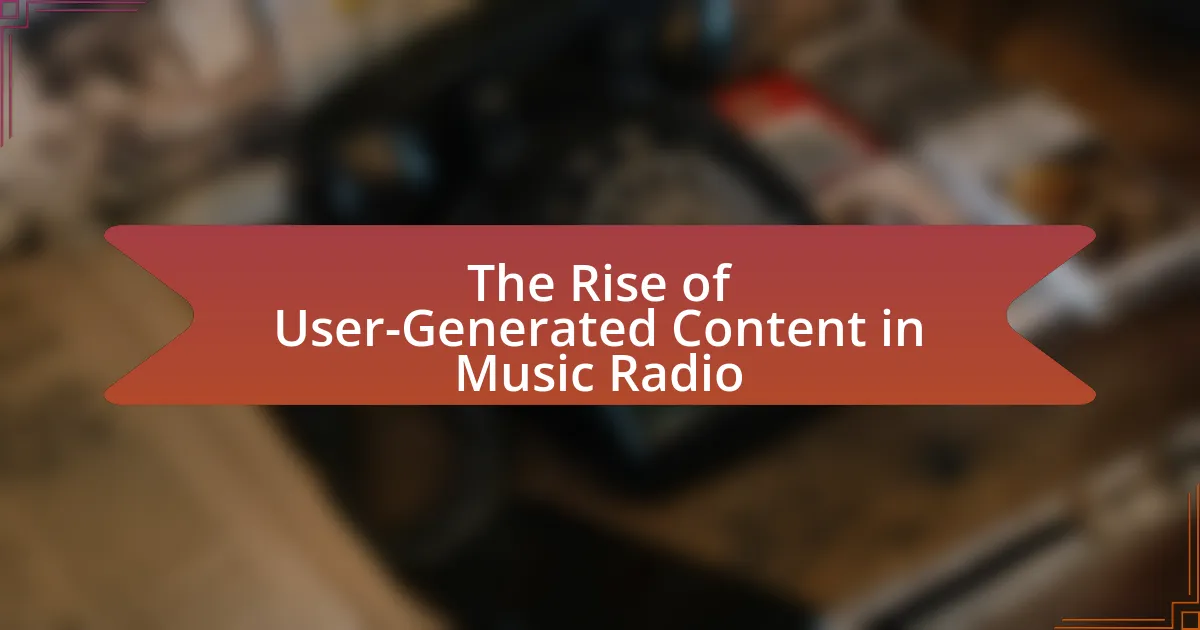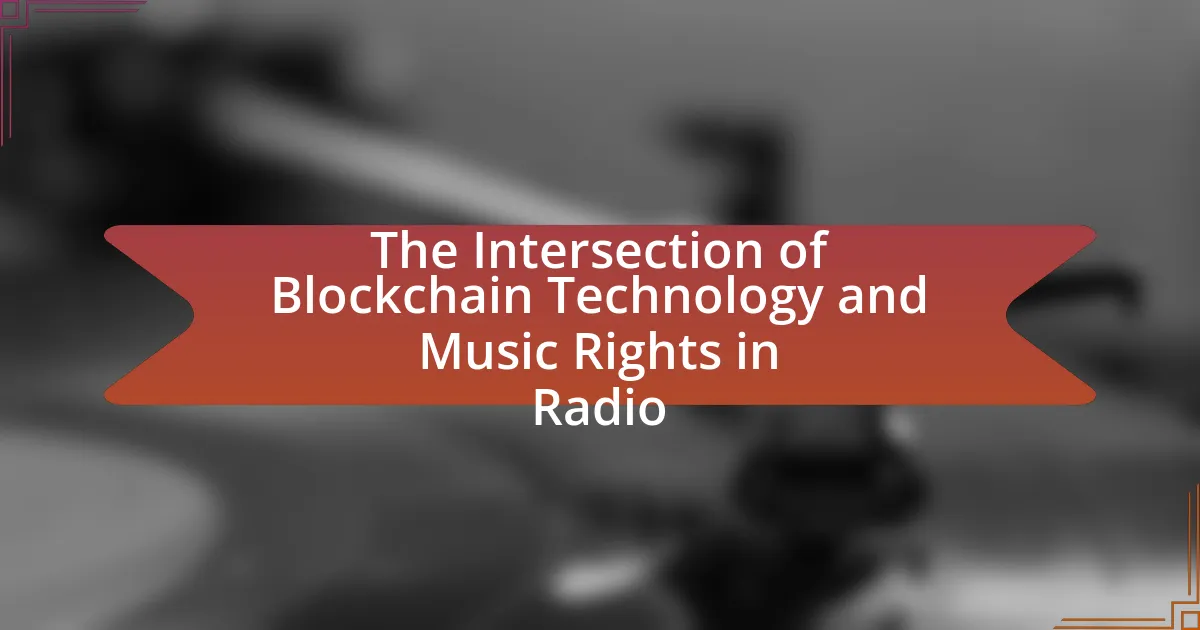Podcasts are playing a pivotal role in the evolution of music radio by offering on-demand, niche content that caters to diverse listener preferences, contrasting with the fixed schedules of traditional radio. This article explores how podcasts have transformed the music radio landscape, highlighting key differences such as personalized listening experiences, the ability to cater to niche audiences, and the impact on music discovery and promotion. It also examines the challenges faced by traditional music radio in adapting to the podcasting trend and discusses strategies for integration and collaboration between the two mediums to enhance audience engagement and retention.
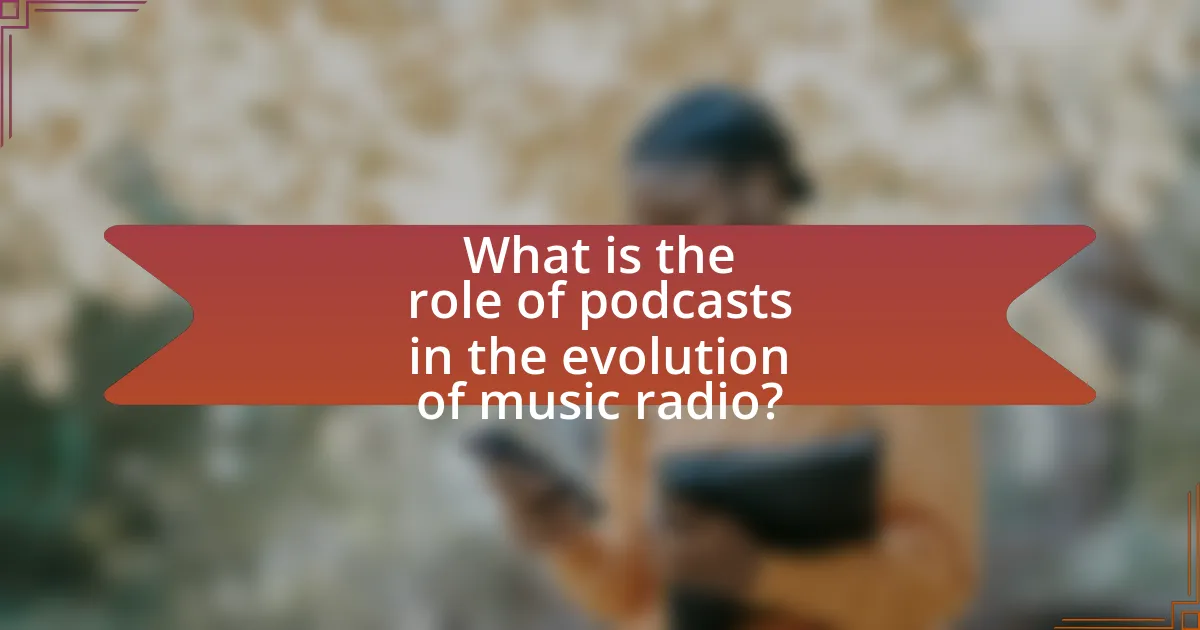
What is the role of podcasts in the evolution of music radio?
Podcasts play a transformative role in the evolution of music radio by providing on-demand, niche content that caters to diverse listener preferences. Unlike traditional music radio, which often follows a fixed schedule and general programming, podcasts allow for personalized listening experiences, enabling audiences to explore specific genres, artist interviews, and music history at their convenience. This shift has been supported by the rise of platforms like Spotify and Apple Podcasts, which have integrated music and podcasting, reflecting a growing trend where 60% of podcast listeners also engage with music streaming services. Consequently, podcasts have expanded the reach and engagement of music radio, allowing for deeper connections between artists and fans while fostering a more interactive and participatory culture in music consumption.
How have podcasts changed the landscape of music radio?
Podcasts have transformed the landscape of music radio by providing on-demand, niche content that traditional radio cannot match. This shift allows listeners to access a diverse range of music discussions, artist interviews, and curated playlists at their convenience, which contrasts with the scheduled programming of conventional radio. According to a 2021 report by Edison Research, 41% of Americans aged 12 and older have listened to a podcast in the past month, indicating a significant rise in podcast consumption that directly impacts radio listenership. As a result, music radio stations are increasingly adopting podcasting strategies to engage audiences, diversify content, and compete with the personalized experiences offered by platforms like Spotify and Apple Music.
What are the key differences between traditional music radio and podcasts?
Traditional music radio primarily broadcasts live content with scheduled programming, while podcasts offer on-demand audio content that listeners can access at their convenience. Traditional music radio relies on real-time broadcasting, often featuring a mix of music, news, and advertisements, whereas podcasts focus on specific topics or themes, allowing for deeper exploration and longer formats. According to the Pew Research Center, as of 2021, 41% of Americans reported listening to podcasts, highlighting the growing preference for the flexibility and variety that podcasts provide compared to the more rigid structure of traditional radio.
How do podcasts cater to niche audiences compared to music radio?
Podcasts cater to niche audiences more effectively than music radio by offering specialized content that targets specific interests and demographics. Unlike music radio, which typically aims for broad appeal to attract larger audiences, podcasts can focus on particular themes, genres, or topics, allowing creators to engage deeply with dedicated listener bases. For instance, a podcast about true crime can attract enthusiasts who are specifically interested in that genre, whereas music radio must play a variety of songs to maintain a general audience. This targeted approach is supported by data indicating that as of 2021, over 50% of podcast listeners reported that they listen to shows that cater to their specific interests, compared to traditional radio, which often lacks such focused programming.
Why are podcasts becoming a popular medium for music content?
Podcasts are becoming a popular medium for music content due to their ability to provide in-depth storytelling and artist interviews that traditional radio cannot offer. This format allows listeners to engage with music on a deeper level, exploring the context behind songs and the creative processes of artists. According to a 2021 report by Edison Research, 41% of Americans aged 12 and older have listened to a podcast in the past month, indicating a growing audience for this medium. Additionally, platforms like Spotify and Apple Podcasts have integrated music streaming with podcasting, making it easier for users to access both forms of content seamlessly. This convergence enhances the appeal of podcasts as a versatile platform for music discovery and appreciation.
What factors contribute to the rise of podcast listenership in music?
The rise of podcast listenership in music is primarily driven by the increasing accessibility of streaming platforms and the growing popularity of on-demand audio content. Streaming services like Spotify and Apple Music have integrated podcasts into their offerings, making it easier for users to discover and listen to music-related podcasts alongside their favorite songs. Additionally, the diverse range of topics covered in music podcasts, from artist interviews to genre explorations, caters to various listener interests, further enhancing engagement. According to a 2023 report by Edison Research, 41% of Americans aged 12 and older have listened to a podcast in the past month, indicating a significant shift towards audio content consumption. This trend reflects a broader cultural movement towards personalized and flexible media consumption, which podcasts effectively provide.
How do podcasts enhance the listener’s experience compared to traditional radio?
Podcasts enhance the listener’s experience compared to traditional radio by offering on-demand content that allows for greater flexibility and personalization. Unlike traditional radio, which operates on a fixed schedule and limited programming, podcasts enable listeners to choose specific topics, episodes, and hosts that align with their interests. This customization leads to a more engaging and relevant listening experience. Additionally, podcasts often feature in-depth discussions and storytelling that can provide richer content than the shorter segments typical of radio broadcasts. According to Edison Research, 55% of podcast listeners report that they enjoy the ability to listen at their convenience, highlighting the appeal of this format over traditional radio.
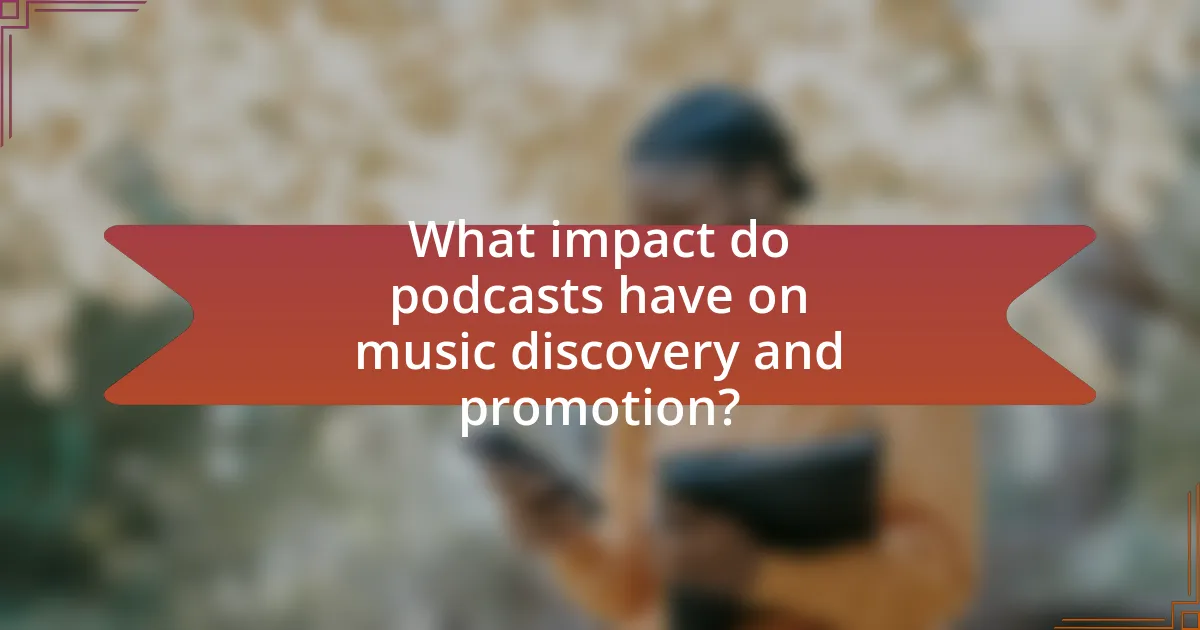
What impact do podcasts have on music discovery and promotion?
Podcasts significantly enhance music discovery and promotion by providing artists with a platform to reach new audiences through storytelling and curated content. This medium allows musicians to share their creative processes, influences, and personal narratives, which fosters a deeper connection with listeners. According to a 2021 report by Edison Research, 41% of podcast listeners discovered new music through podcasts, highlighting their effectiveness in promoting emerging artists and genres. Additionally, podcasts often feature exclusive interviews and live performances, further engaging audiences and driving interest in the featured music.
How do podcasts influence the way listeners discover new music?
Podcasts significantly influence the way listeners discover new music by providing curated content that highlights emerging artists and genres. Through discussions, interviews, and music recommendations, podcasts create a platform for artists to reach wider audiences, often featuring exclusive tracks or live performances that listeners may not encounter through traditional radio. For instance, a study by Edison Research found that 54% of podcast listeners reported discovering new music through podcasts, showcasing their effectiveness as a medium for music discovery. This trend is further supported by the rise of genre-specific podcasts that cater to niche audiences, allowing listeners to explore music that aligns with their personal tastes.
What role do podcast hosts play in promoting new artists and songs?
Podcast hosts play a crucial role in promoting new artists and songs by providing a platform for exposure and discussion. They often feature interviews with emerging musicians, allowing these artists to share their stories and music directly with listeners. This direct engagement can significantly increase an artist’s visibility and fan base. For instance, podcasts like “Song Exploder” dissect songs and highlight the creative process, which not only showcases the artist’s work but also connects listeners to the music on a deeper level. Additionally, hosts may curate playlists or recommend songs, further influencing listener preferences and driving traffic to new releases. This promotional power is evident in the growing trend of artists leveraging podcasts as a marketing tool, with many reporting increased streams and sales following their appearances.
How do curated playlists in podcasts differ from traditional radio playlists?
Curated playlists in podcasts differ from traditional radio playlists primarily in their personalization and accessibility. Podcasts allow creators to tailor content specifically to niche audiences, offering curated selections based on listener preferences, themes, or topics, whereas traditional radio playlists are often determined by broader audience appeal and commercial considerations. This personalization is supported by data analytics, which enables podcasters to understand listener behavior and preferences, leading to more targeted content delivery. In contrast, traditional radio relies on a fixed schedule and limited listener interaction, resulting in a one-size-fits-all approach.
What are the challenges faced by music radio in adapting to the podcasting trend?
Music radio faces several challenges in adapting to the podcasting trend, primarily including competition for audience attention, the need for content diversification, and monetization difficulties. The rise of podcasts has shifted listener preferences towards on-demand content, making it essential for music radio to compete with the convenience and variety offered by podcasts. Additionally, music radio must diversify its content beyond traditional music programming to attract and retain listeners who seek engaging narratives and discussions, which are prevalent in podcasts. Furthermore, monetizing podcast content presents challenges, as traditional advertising models may not translate effectively to the podcast format, requiring innovative strategies to generate revenue. These challenges highlight the need for music radio to evolve and integrate podcasting elements to remain relevant in a changing media landscape.
How are traditional radio stations responding to the rise of podcasts?
Traditional radio stations are adapting to the rise of podcasts by integrating podcast content into their programming and developing their own podcast series. This shift allows radio stations to reach a broader audience and engage listeners who prefer on-demand content. For instance, many stations have begun to create original podcasts that feature popular radio personalities or focus on niche topics, thereby leveraging their existing talent and brand. According to a 2022 report by Edison Research, 41% of Americans aged 12 and older listen to podcasts monthly, indicating a significant market that traditional radio aims to capture. Additionally, some radio stations are offering their live broadcasts as podcasts, allowing listeners to access content at their convenience, which aligns with the growing trend of on-demand media consumption.
What strategies can music radio adopt to remain relevant in the podcast era?
Music radio can remain relevant in the podcast era by integrating on-demand content and enhancing listener engagement through interactive features. By offering podcasts that complement their music programming, radio stations can attract audiences seeking curated content and storytelling. For instance, according to a 2021 report by Edison Research, 41% of Americans aged 12 and older listen to podcasts monthly, indicating a growing audience for audio content. Additionally, incorporating listener feedback and participation through social media or live call-ins can create a more personalized experience, fostering community and loyalty among listeners. This strategy aligns with the trend of personalization in media consumption, as highlighted by a Nielsen study showing that 70% of consumers prefer content tailored to their interests.
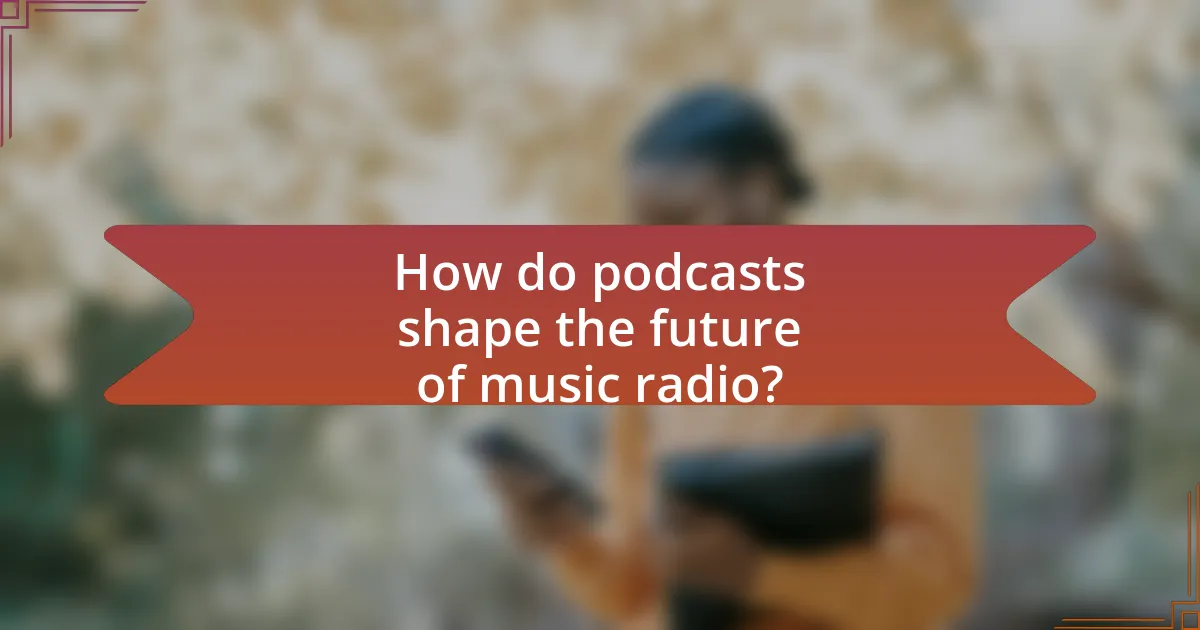
How do podcasts shape the future of music radio?
Podcasts shape the future of music radio by providing on-demand, niche content that caters to diverse listener preferences. This shift allows audiences to engage with music-related discussions, artist interviews, and curated playlists at their convenience, contrasting with traditional radio’s scheduled programming. According to a 2021 report by Edison Research, 41% of Americans aged 12 and older have listened to a podcast in the past month, indicating a growing trend that music radio must adapt to in order to retain relevance. As podcasts continue to rise in popularity, music radio is increasingly integrating podcast-style content, such as themed shows and storytelling, to attract and maintain listeners.
What trends are emerging in the podcasting space that could affect music radio?
Emerging trends in the podcasting space that could affect music radio include the rise of niche content, increased listener engagement through interactive formats, and the integration of music into storytelling. Niche content allows podcasts to cater to specific audiences, which can draw listeners away from traditional music radio that often targets broader demographics. Interactive formats, such as live podcasts and audience participation, enhance listener engagement, making podcasts more appealing compared to static radio broadcasts. Additionally, the integration of music into narrative-driven podcasts creates a unique listening experience that can attract music enthusiasts, potentially diminishing the audience for conventional music radio. These trends indicate a shift in how audiences consume audio content, posing challenges for traditional music radio to adapt and retain listeners.
How might technology advancements influence the integration of podcasts in music radio?
Technology advancements will significantly enhance the integration of podcasts in music radio by enabling seamless distribution and personalized content delivery. Innovations such as streaming platforms and mobile applications allow radio stations to easily incorporate podcast episodes into their programming, reaching wider audiences. For instance, the rise of smart speakers and voice-activated devices has facilitated on-demand access to both music and podcasts, making it easier for listeners to engage with diverse audio content. Additionally, data analytics tools provide insights into listener preferences, allowing radio stations to tailor their podcast offerings to meet audience demands, thereby increasing listener engagement and retention.
What potential collaborations could arise between podcasts and music radio?
Potential collaborations between podcasts and music radio include co-produced content, where podcasts feature music radio segments or interviews with artists, enhancing listener engagement. Additionally, music radio stations could integrate podcast episodes into their programming, providing a platform for niche topics that appeal to specific audiences. This collaboration can also extend to cross-promotion, where music radio stations promote popular podcasts, and podcasts feature music from the radio station, creating a symbiotic relationship that drives audience growth for both mediums. Such partnerships leverage the strengths of each platform, with podcasts offering in-depth storytelling and music radio providing immediate access to music and live interactions.
What best practices can music radio adopt from podcasts?
Music radio can adopt several best practices from podcasts, including storytelling, audience engagement, and niche content creation. Storytelling enhances listener connection by weaving narratives around music and artists, similar to successful podcasts that captivate audiences through compelling stories. Audience engagement can be improved by incorporating listener feedback and interactive elements, as many podcasts actively involve their audience through social media and live events. Additionally, focusing on niche content allows music radio to cater to specific listener interests, akin to how podcasts often target specialized topics, thereby attracting dedicated audiences. These practices are validated by the growing popularity of podcasts, which have seen a 20% increase in listenership from 2020 to 2021, indicating a strong demand for engaging and tailored audio content.
How can music radio enhance audience engagement through podcasting techniques?
Music radio can enhance audience engagement through podcasting techniques by creating on-demand content that allows listeners to access shows at their convenience. This flexibility caters to diverse listening habits, as evidenced by a 2021 Edison Research report indicating that 41% of Americans aged 12 and older listen to podcasts monthly. Additionally, music radio can utilize storytelling and interviews within podcasts to deepen listener connections, fostering a sense of community and loyalty. Engaging formats, such as themed episodes or listener call-ins, can further personalize the experience, making audiences feel more involved. These strategies collectively contribute to increased listener retention and interaction, demonstrating the effectiveness of podcasting techniques in enhancing audience engagement for music radio.
What lessons can be learned from successful music podcasts for traditional radio?
Successful music podcasts demonstrate that traditional radio can enhance listener engagement by incorporating storytelling and personal narratives. This approach fosters a deeper connection with the audience, as evidenced by the popularity of podcasts like “Song Exploder,” where artists share the creative process behind their music. Additionally, successful podcasts often utilize niche content to attract specific demographics, which traditional radio can adopt to cater to diverse listener interests. For instance, the podcast “All Songs Considered” focuses on new music discovery, appealing to listeners seeking fresh sounds. Furthermore, podcasts frequently leverage social media for audience interaction, a strategy that traditional radio can implement to build community and encourage listener feedback. These lessons highlight the importance of adaptability and audience-centric programming in the evolving landscape of music radio.
